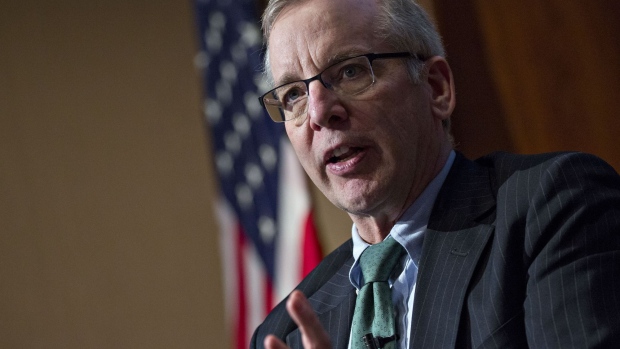Jun 16, 2022
Fed to Lose Money Next Year as It Raises Rates, Dudley Says
, Bloomberg News

(Bloomberg) -- The Federal Reserve looks on course to lose money next year as it raises short-term interest rates to try to rein in inflation, according to former New York Fed President William Dudley.
That’s because the interest rate the Fed will be paying out to banks for the reserves they hold at the central bank will be greater than the rate it earns on its huge holdings of Treasury and mortgage-backed securities.
While the losses won’t impact the Fed’s ability to conduct monetary policy, they will dissuade policy makers from selling mortgage-backed securities because that would add to the red ink, Dudley told a webinar on Thursday sponsored by Official Monetary and Financial Institutions Forum.
Fed Chairman Jerome Powell and his colleagues raised rates on Wednesday by 75 basis points -- the biggest hike since 1994 – and penciled in further increases for the balance of this year and into next. They now see rates rising to 3.4% at the end of this year and 3.8% at the end of 2023, according to their median projection, from a current target of 1.5% to 1.75%.
“If we stay on this trajectory, the Fed is definitely going to lose money in calendar year 2023,” Dudley, who is an adviser to Bloomberg Economics, said.
In that event, the Treasury would create a so-called deferred asset on the Fed’s balance sheet so that the central bank would not have to deplete its capital, he said. “Monetary policy implementation won’t be affected” as a result.
Besides raising interest rates to quell inflation, the Fed is also reducing its mammoth balance sheet by not replacing the securities it holds when they mature. It’s also held out the possibility of selling some of its mortgage-backed securities as part of its plan to slim its balance sheet.
“If they’re losing money they’re not going to be selling agency MBS,” Dudley said. “Every one they sell is going to add to their losses.”
He expects the Fed losses to trigger a “fierce debate” about the Fed’s past use of quantitative easing to aid the economy. Opponents of QE could seize on the losses to argue that the Fed shouldn’t be in the business of buying longer-dated securities.
It would be a disaster if they win the debate, according to Dudley. “If that were to happen that’s really dangerous because you’re taking away a very important tool of monetary policy when the Fed is at the zero lower bound” of short-term interest rates, he said.
©2022 Bloomberg L.P.





